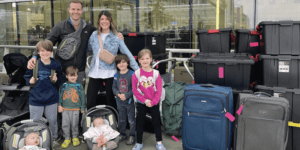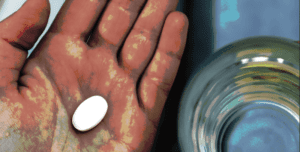
The Season of Light Around the World
As the trappings of the Thanksgiving and Christmas seasons emerge around us in North America, things look and feel quite different for our colleagues serving around the world. For cross-cultural missionaries serving far from home, this time of year is complicated.
Doug Lindberg, MD
“It was the best of times, it was the worst of times…
It was the season of Light, it was the season of Darkness.
It was the spring of hope, it was the winter of despair….”
—Charles Dickens, A Tale of Two Cities
As the trappings of the Thanksgiving and Christmas seasons emerge around us in North America, things look and feel quite different for our colleagues serving around the world. For cross-cultural missionaries serving far from home, this time of year is complicated. Charles Dickens’ famous lead-in from A Tale of Two Cities nails it. It’s both beautiful and brutal. It’s filled with both fellowship and loneliness. It’s light, and it’s dark. You love being there, and yet you wish you could be home, all at the same time.
On the one hand, it is truly a joy to learn about the culture and traditions of the host culture. New Christmas carols in a new language. New foods and smells coming from kitchens and church courtyards. New ways to approach gift giving. Seeing how another culture marks the birth of our Savior can reveal new facets of the wonder that is Christ taking on flesh. And there are even new holidays to celebrate! These are fun and special moments and events to experience.
It’s also an opportunity to share some special parts of American holiday culture with friends and colleagues. Thanksgiving is not a holiday most of the world observes, so gathering national and missionary friends together to give thanks and feast together is wonderful. Somehow this particular holiday seems to transcend culture. Giving thanks and sharing a meal is good for our souls, regardless of our nationality.
However, for countless missionaries, the holiday season can also be a grind. Healthcare missionaries face the same challenges our healthcare colleagues back home do of needing to continue to provide clinical coverage. It doesn’t matter if you’re in Detroit or in Dakar, it’s no fun to have to work overnight in the emergency room on Thanksgiving or go in for a C-section in the middle of Christmas dinner.
Additionally, being far from family and the traditions of holidays at home is hard. Missing out on holding a newborn niece or nephew, watching NFL games, hugging people you love and eating mom’s special green bean casserole and pumpkin pie—these are all little, but necessary, sacrifices. And if a missionary has experienced the loss of a loved one recently, being away from family can be especially difficult.
Nevertheless, along with the sacrifices come new joys. The holidays are a time of year where the new bonds between missionaries truly coalesce into what can only be described as family ties. Teammates and national friends become “aunties” and “uncles.” New traditions emerge. It’s a beautiful thing to experience and witness.
To help illustrate some of this complexity and tension, I’d like to share a few anecdotes about two different Thanksgivings my family and I experienced while serving as missionaries in South Asia. One has notes of Currier and Ives. The other, not so much.
First, the good Thanksgiving. We’d planned the festivities with our friends for weeks in advance, and we eagerly anticipated our gathering. As the abbreviated day at the hospital wrapped up, my wife Ruth put the finishing touches on the lattice that topped her homemade apple pie and baked it to a golden-brown perfection. We packed up the kids, the pie and the sweet potato casserole—comprised of potatoes grown just for this occasion, along with imported marshmallows—and headed to the celebration next door. The warmth and love that permeated our friend’s home as dinner approached that evening was as thick as the rich and delicious smells coming from their kitchen. A beautifully haphazard group of guests assembled through the course of the evening, bringing their own additions to contribute to the feast. Some of us had known and served together in ministry in this small village in the Himalayan foothills for years. Others had been there for only a few days. Americans, Germans, Brits, Swedes and Nepalis gathered together, most of us far from our families of origin but feeling every bit a part of the family atmosphere embodied that evening. The food nourished our bodies, and the keeping of a beloved tradition with people we had come to love nourished our souls. As I looked around, I felt deep affection for my friends who were gathered together, and I knew the feeling was mutual.
Even as Ruth and I enjoyed every minute of our time with this group of people we loved and served with, we still felt a twinge of ache in our hearts. We knew a similar celebration would be unfolding 7,000 miles away with our families and church community back home. And we wouldn’t be a part of it. Yes, there would be Skype calls, with stories of the day and pictures of the kids exchanged, but we wouldn’t be there. In spite of the warmth and love of the evening, a little bittersweetness was there too, intermingled with the joy.
However, for some holiday seasons, sweetness and joy aren’t part of the equation. Instead, it just feels flat out bitter. Missionaries by no means have a corner on Thanksgiving thuds and crummy Christmases, but many who have served overseas can tell of doozies that could inspire another sequel of National Lampoon’s Christmas Vacation. That brings us to the bad Thanksgiving of 2012. Our family of four had been in the capital city for meetings for a week and needed to get back to the mission hospital as staff coverage was thin. I planned things out so we would begin our cross country, 20-hour journey back to the hospital early on Thanksgiving morning. This would allow us to make it by dinnertime to Travelers Rest, a special oasis known for their roasted chicken dinners and spotless rooms.
Things didn’t turn out how I planned. Our vehicle was delayed, and delayed, and delayed. We didn’t leave until mid-afternoon, and the roasted chicken dinner became an unrealized fantasy. The dreary weather and darkness hid the beauty of the landscape. Carsickness made itself our companion, with all its accoutrements. Our Thanksgiving dinner was lukewarm lentils and rice in the dark, as power was out alongside the highway. It was incredibly lonely and eerily quiet among our small traveling party. Thinking of the steaming turkey and mashed potatoes on the table back in Chicago, Illinois that day was pretty rough. Months later, Ruth begrudgingly offered forgiveness for the misadventures I led my family into that day, but not before securing solemn promises that such a trip would never be attempted on a holiday again.
Hopefully these reflections help you understand the value and importance of connecting with and praying for your missionary colleagues serving around the world during the Thanksgiving and Christmas season. It’s a challenging time, and encouragement from those they know and care for back home can really provide wind in their sails. Some missionaries are more open and forthright with their needs and challenges around the holidays than others.
With that in mind, here are some practical suggestions of ways you can bless your missionary friends and colleagues during this special time of the year.
- And let them know you’re praying. Learn what their requests and needs are, and lift these up specifically on a regular basis. It’s so nice to know, while on the field, that others are engaged in the battle with you and have your back. Spiritual oppression and attacks are all too real in the places where healthcare missionaries serve, and prayer warriors willing to step into the fray are desperately needed.
- Go and serve. A visit around the holidays can provide some much-needed extra help and clinical coverage, and it allows for missionaries to have additional time with family and friends. This can be particularly helpful coming from “serial short-termers” who have visited before, as they know the lay of the land and don’t require extensive orientation upon arrival. It sure would have been nice to have someone covering the hospital so we could have stayed away for a few extra days and avoided the Thanksgiving disaster noted above! Short-term teams, including teams from CMDA’s Global Health Outreach (GHO), create fantastic opportunities for outreach around the holidays, while providing valuable medical care and building rapport and trust with the surrounding community. For more information about GHO, visit cmda.org/gho.
- Go and teach. Medical education is always appreciated as well. Some mission hospitals have needs for formal instruction and trainee oversight through residency programs. Plus, almost any place will welcome those who are willing to come and provide hands-on, bedside instruction and the occasional grand rounds talk to staff members. Opportunities for this sort of ministry are available through CMDA’s Medical Education International (MEI). For more information about MEI, visit cmda.org/mei.
- If the missionary you support puts out a “Christmas wish list” for their ministry, help check a few items off it. Consider meeting these needs as gifts given in honor of someone close to you, and then you can put a card describing the gift under the tree. Perhaps you might even be willing to spearhead a Christmas giving campaign to fund a MedShare container loaded with medical supplies to be sent to a missionary’s facility, or you could organize a capital campaign to purchase a new operating room table or build a new emergency room.
- Send a care package. Special items from home, including special holiday decorations or treats, can be hard to find. You might also consider a cash gift to allow for a weekend getaway with their friends or family. If you don’t need the tax deduction, you can give these funds directly to missionaries through a personal check, bank transfer or PayPal, so they don’t need to pay taxes or administrative fees for the gift.
- Offer to help, however you can. Can you write grant requests? If so, offering your services would be the equivalent of gold, frankincense and myrrh for your missionary colleagues. If a missionary is on home assignment around the holidays or has recently returned from the field, ask them how you can help them. It might be babysitting while they shop or wrap gifts. It might be praying with them. It might be having them over to share in your family’s Thanksgiving or Christmas. This list could go on and on. Be proactive!
May your holiday season this year be filled with thankfulness and reflection on the wonder that is Jesus taking on flesh, bringing hope to the world. As you celebrate, please remember your healthcare missionary colleagues serving around the world who are bringing hope and healing in His name. Make it a point to bless them as they seek to bless others. And by blessing them, you will help make this holiday season a true season of light around the world!
Get Involved
CMDA’s Center for Advancing Healthcare Missions (CAHM) seeks to mobilize and support physicians, dentists, nurses, therapists and other health personnel to use their professional skills to help people encounter Jesus, here in the U.S. and around the world. For more information and to get involved, visit www.cmda.org/cahm.
About the Author
Doug Lindberg, MD, has served at CMDA as the Director for the Center for Advancing Healthcare Missions since 2020. He attended Loyola University, Chicago for medical school, completed a family medicine residency at Waukesha Family Practice Residency and then completed a one-year rural health fellowship at East Tennessee State University. The Lindbergs served in South Asia as missionaries from 2009 to 2013, and Doug served as the medical director for a mission hospital there. They returned to the U.S. in 2013 for what was intended to be a one-year furlough. However, a series of unexpected events, including his wife’s life-threatening cancer diagnosis followed by her miraculous healing, led them to relocate back to Wisconsin where they continue to reside. In addition to his work with CMDA, Doug works part-time clinically in urgent care. He and his wife Ruth are both family physicians, and they have two children, Maddie and James. He also enjoys running, hiking and coaching his son’s sports teams.











